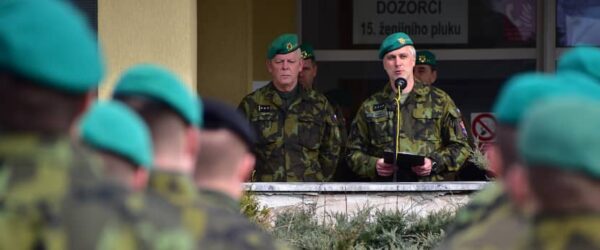After a long time, the opportunity arose for the Seventh-day Adventist Church to once again send a pastor to the chaplaincy service in the army of the Czech Republic. Since October 2020, Tomáš Harastej has been part of the 15th Engineer Regiment in Bechyn as a military chaplain. Harastej is married and the father of two sons. He was recently interviewed about his role and its relationship to the mission of the church.
Tom, first I want to ask, how did God call you to the preaching work?
This is a very difficult question to answer briefly, and at the same time it is quite personal. And I don’t want the answer to be some cliché. The question of God’s calling—I believe that God called me to be a preacher, but in retrospect I am not sure how it came about. My decision also played a role there.
You have worked as a pastor in several places. Could you name the places where you have served and tell us which area of the preaching ministry is closest to you?
I started my preaching ministry in the congregation in Suchdol nad Odrou, then I spent the longest time in Olomouc, Prostějov, and very briefly in Brno. I believe that I have received spiritual gifts from God, and also a great trust from God. However, as a young, vain preacher, I often used this endowment for things other than exalting God and the gospel about Him. In retrospect, I think that the closest area of my ministry should have been prayer and time spent in humility before God. But I remember all the places very fondly, because everywhere I met really very special people from whom I could learn and draw from. I have beautiful memories.
In the past 15 years, there has been a significant increase in the number of chaplains who work in prisons and hospitals. You decided to work in the army. What motivated you to do this ministry?
Of course, I thank the Adventist Church for allowing me to enter this ministry after many conversations about it. I could say I went for it because it was a challenge, because at that time our church did not have a chaplain in the army. Or I could say that I needed a big change in my life, and that would be true too. There are several reasons. Perhaps the biggest turning point came when my wife strongly supported me after earnestly praying about it. She told me that God responded to her question about His will with a specific answer, which was “yes” to being a military chaplain. After that, I did not hesitate. It was such a confirmation that it was a good decision and that God would bless me in this ministry.
It is known that preparation for service in the army is demanding not only for recruits but also for chaplains. Can you describe what conditions you had to meet and what was expected of you before you started your job?
As chaplains, we must undergo exactly the same preparation as any other soldier who joins the army. So, it was rather demanding training, and later various career courses, such as an officer course. I think all the courses and education we take were interesting and rewarding. At the same time, we have to pass physical fitness tests and the like. Among other things, we also have to go through a fairly detailed psychological examination.
What does your typical working day look like?
The chaplain, by the nature of his position, is part of the commander’s personal staff. So, he participates in various meetings, personnel councils, and the like. Commanders often say that the chief warrant officer, the chaplain, and the psychologist are his right hand, especially when it comes to his approach to people. There are a lot of those people. Specifically, our regiment, which has three battalions, has a little more than a thousand people, or soldiers, if you will.
Every day is different. The content of the day usually includes participation in some meetings. The meetings are really very effective, and it is expected that people will be ready and present their contributions.
I have specific conversations with people I have been asked to talk to. I often conduct an ethics seminar for specific groups, and I participate as a chaplain in some training.
Often, the commander sends us to go where soldiers are stationed and bring back ideas and insights. About every two weeks, I conduct a service in the local chapel. Sometimes, I give speeches at specific events, and act as moderator or speaker at funerals and weddings.
What is the difference between chaplaincy and pastoral work?
One of the fundamental differences is that the people I am here for as a chaplain are mostly those who consider themselves so-called non-believers. I think that the secular environment is more “forgiving” and accepting of human mistakes. It is generally more tolerant. Unlike a chaplain, a pastor is certainly under more pressure to be a model of perfection, to be flawless, and so on.
But I think the link between a church and a secular environment is that in both, you have “sick” people. All of us are, in a sense, sick. From my point of view, it is important not to play doctors and experts but to transmit that the only real physician is God and that we all need a miracle of healing—the society around us, the church, and also ourselves.
Pastors do not have it easy at all. There is enormous pressure on them from forces not from God. But I would like us to see the preacher and the chaplain as equal servants of God with everything that belongs to humanity on this earth. The only one changing human lives must be God and His love.
The original version of this story was posted by the Czech-Slovak Union Conference.



